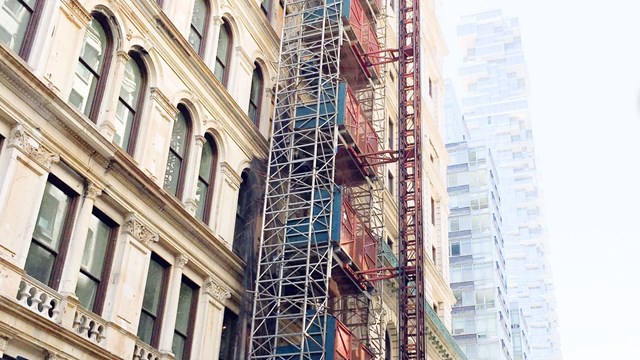We’ve all heard that “first impressions are important” when meeting people; so too with buildings. A potential buyer’s or visitor’s first impression often determines their opinion of the building and its apartments and has a dramatic impact on their decision to buy or rent. At Cooper Square Realty, we call it “curb appeal.”
While our initial definition of “curb appeal” applied to the physical aspects of a property, it has evolved to include much more. Today, “curb appeal,” the amenities and quality of life a building provides, is the most significant factor a board and residents control in determining the value of apartments.
Whether or not people are conscious of the various factors involved in their first impression, appearances plan an important role. The sidewalks and curbs should be clean and in good condition and the landscaping attractive and groomed. The awning should be in good condition without tears or the address faded. All these make an immediate impression.
In the lobby, are the doormen nicely dressed or looking a bit disheveled with torn uniforms and are they wearing their hats? Did the doorman promptly open the door and have a proper, friendly greeting, or did he barely get to the door and seem disinterested in the visitor? It’s amazing the significant impact a doorman has.
Is there a computer at the front desk, or is the desk littered with Post-It-Notes? Does the doorman call up to announce visitors or just permit them to go unannounced? Today, with computers so readily in use, it is increasingly common to have systems to track messages, deliveries and visitors, eliminating the need for handwritten notes, increasing efficiency and creating permanent records.
Some systems are fairly basic, while others are considerably more sophisticated, such as CooperSquare Connect, which provides a multitude of functions.
Next is the lobby. How well is it decorated, is it well-lit and is the furniture in good condition or worn? Do all the light bulbs have the same color spectrum or are there areas that appear in different hues? It’s the same for the carpets and the paint and the wallpaper. Is it the type of environment buyers would want to come home to every day?
This “curb appeal” follows to the elevator and into the hallways of the building. Elevators and hallways must be clean and not look neglected and worn.
All this has to be viewed in relation to similar properties in the neighborhood and city. In effect, every building, whether a new condominium or a prewar co-op, is competing against comparable properties to attract buyers and get the best price for sellers.
All of these factors play a significant role in determining the real value of a building and its desirability. If the building is up to standard and beyond, it helps to attract solid bids. If lacking, the unit owner or shareholder has to be ready to accept a lower offer.
Interestingly, these can be improved without much cost. The key is the capability of the property manager and the superintendent to properly supervise and motivate the staff. The front of the building should be checked daily to make certain the sidewalk and curbs are clean. Light bulbs should be immediately replaced when they are out. Elevator tracks need to be kept spotlessly clean.
With proper training and supervision, doormen and concierges can improve their attitude and work habits.
These tangibles and intangibles are most important for older buildings, which compete with the amenity-driven new condominiums sprouting up throughout Manhattan. The new properties, most in the “hottest” areas of the borough such as Chelsea and Downtown, are packed with amenities that include health clubs, private dining and entertainment rooms, playrooms for children and technology to improve communication.
It is difficult for older buildings to compete with the newer buildings based on the amenities. First of all, upgrading would be expensive and many shareholders or unit owners might oppose spending the money. Secondly, the buildings may lack sufficient space. Thus, the older buildings should focus on their strengths. This is where the “curb appeal” comes into play. With quality management that maximizes operations while controlling costs, through diligent attention to the physical look and cleanliness of the property and with services that create an exemplary quality of life, from the attitude and attention of the doormen to the work of the maintenance staff, a building can be positioned as a wonderful place to live and maximize its value.
David Kuperberg, CPM, is the president of Cooper Square Realty, a Manhattan-based real estate firm specializing in property management, residential and commercial sales and leasing, investments, and mortgage brokerage.










Leave a Comment